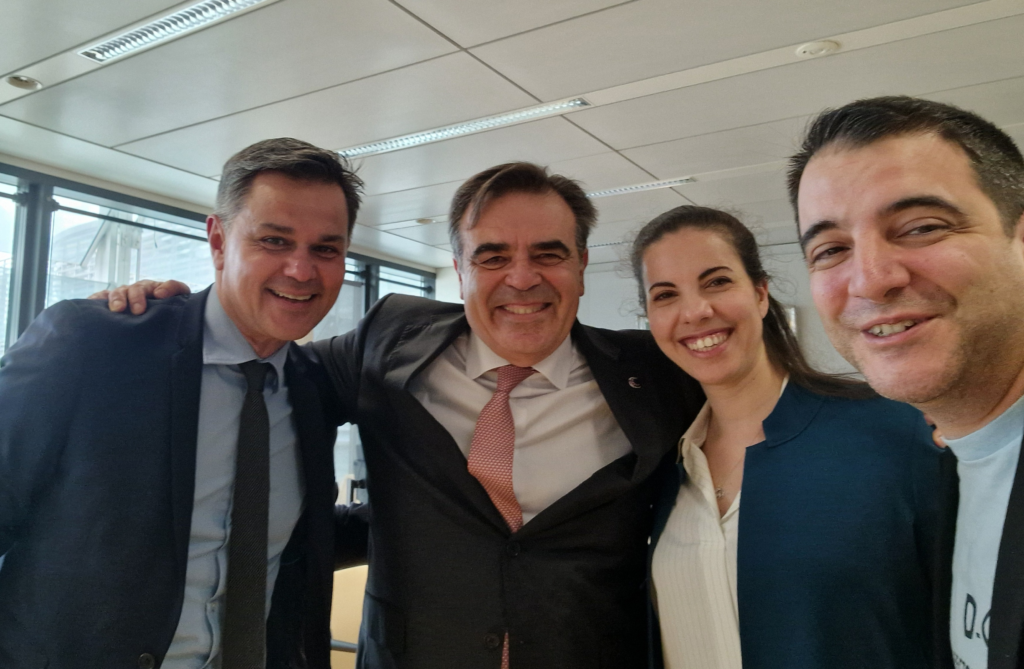Interviewing Vice-President Margaritis Schinas, the Midday Matador, the Father-of-us-all DG COMMers, the EU’s favorite son… I didn’t think I could be up to the challenge, he is too good to let anything controversial slip. Nevertheless, after years of online interactions and memes, I gathered up my courage, contacted his communication advisor Vangelis Demiris and set up a meeting.
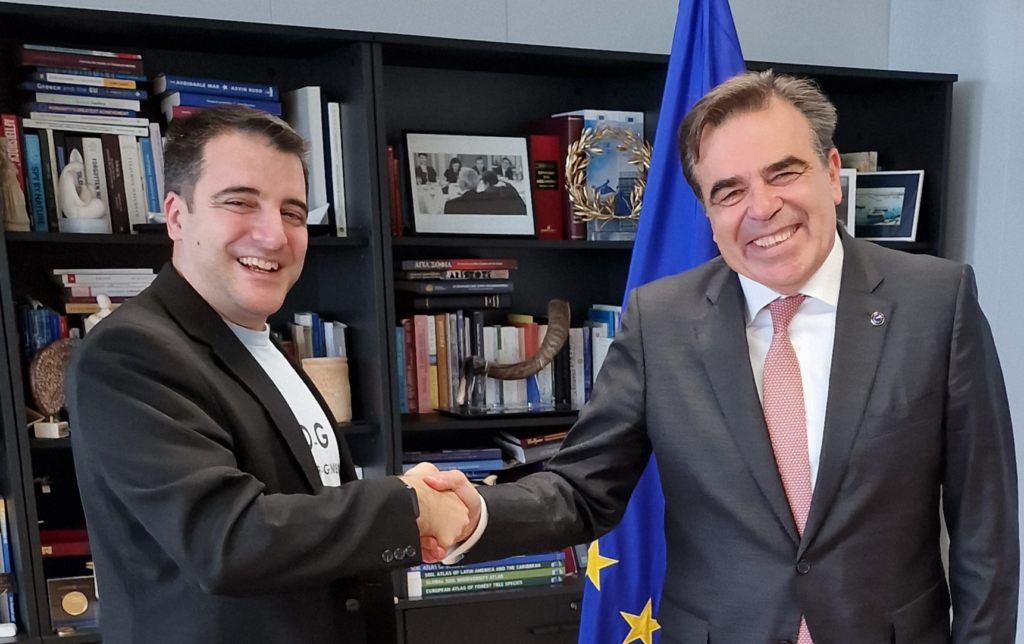
Accompanied by my trusted Martina, we walk the long corridors of the eleventh floor of the Berlaymont. Schinas welcomes us in his classy office with a big smile: “Ah, finally, the man of the memes!” And he starts firing questions at us about DG MEME.
Margaritis, you already took control of the interview. I am supposed to be the one asking the questions…
As a long time fan of DG MEME I have the right to be curious. What you do is very fresh, very creative, and many people feel tempted to be part of it. And it’s not a crazy Love-the-EU page, it has edge. I think that’s part of the success, one has to be crisp. But alright, let’s start!

Tell us something about the young Schinas. How was your childhood during the military junta?
I had a fairly normal, almost boring, life; the dictatorship lasted until I was twelve. I was very innocent and living in a world that I thought made sense, although it didn’t.
As a child, did you perceive the regime impact on your life?
I perceived the fact that it did not stimulate my life. There was no input, there was no freedom, and it was all boring and grey. I didn’t feel inspired to do anything during those years. I was going to elementary school, I was a good student, I would come back home and watch state propaganda TV, it was just… plain boring.
Did things improve during Metapolitefsi, the transition from the military junta to democracy?
Absolutely, 1974 was my butterfly moment: I got out of the boring cocoon and became passionate about public life and politics. I had it very clear in my mind that I wanted to be part of this transition. My parents were already joking back then that I would be the leader of the opposition. And I didn’t even know what the opposition was, because it didn’t exist in the dictatorship.
The regime did not stimulate my life. There was no input, there was no freedom, it was all boring and grey. I didn’t feel inspired to do anything
Specifically, what was the main differences you noticed during the transition?
The new input. You know, what was a boring media market all of a sudden became more appetizing: there were parliamentary debates, political parties being formed, new elections, and the referendum to abolish the monarchy; all this happened within four months. And for me it was like opening a curtain: I didn’t know exactly where and how, but I knew I wanted to be part of that show.
Were your parents involved with politics?
Not really, they were both educators, they were professors of Greek history. And they clearly stimulated my passion for the classics: I grew up with Greek mythology, with Homer, with a classical upbringing, and it helped me a lot in politics.

When did the EU first appear in Greek politics?
Quite soon: just five years after the end of the dictatorship, Greece joined the EU. When the accession treaty was signed I was 17, I had just started university, and I was already involved in student politics. Suddenly it was very clear to me that I wanted to be part of the European part of politics, I felt it like a generational call.
Dreaming about the EU at seventeen, quite uncommon, right? Was there anything that inspired you, maybe a book?
I wouldn’t say a book, my interest in Europe was the result of all the changes happening in those years: democracy, parliamentary debates, campaigns, Giscard d’Estaing coming to Athens for the accession ceremonies… It was flashes, images, flags, all directed to this idea: Europe is openness, the opposite of grey. At university I was already tracing my path to Brussels. I didn’t come here by accident, I am a believer.
My interest in Europe was the result of all the changes happening in those years: democracy, parliamentary debates, campaigns, Giscard d’Estaing coming to Athens for the accession ceremonies…
Who told you about Brussels? How could you be sure you would have liked the de facto capital of the EU?
Oddly enough, my uncle, my father’s brother, was an officer in the Greek army and he was posted at the NATO Headquarter. So my first glimpse of Brussels was when we came to visit him.

And you really liked Brussels?
A lot, I did not imagine how important that visit would be for me! I remember walking around the old Berlaymont and seeing the flags and telling my parents: “One day I’ll be working here”. After this trip to Brussels, another friend told me about the College of Europe in Bruges and how interesting it had been for him. So I also made it part of my path.
That was in 1985-1986, correct?
Exactly, the year of the Spanish and Portuguese accession, the Cristobal Colon promotion.
A controversial name these days. And, besides politics, you are a big fan of football, did you play it as a young man?
I played basketball at Aris Thessaloniki, but at that time only the football part of my club was famous. When I stopped playing basket, my team became popular. Nevertheless, in my teen years, I was a very visible person in society because of basketball.
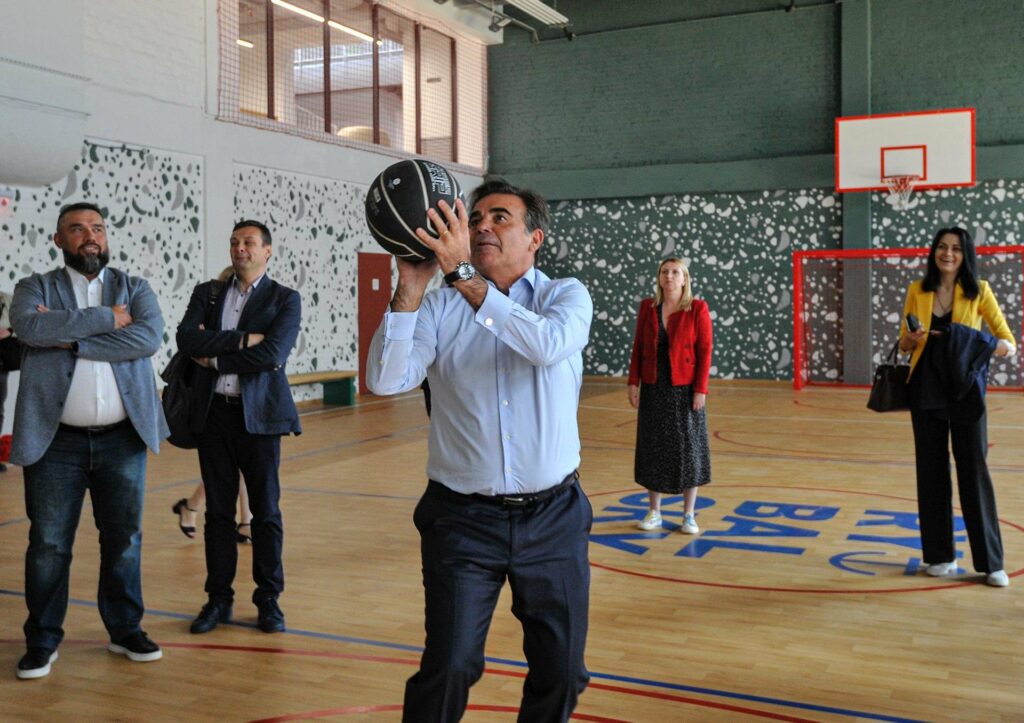
Sport and politics work well together?
Yes, basketball helped me a lot: when I was in law school, my face was already known and at 18-19 I already took part in student debates even on national television. And I’ve always supported center-right parties, but at that time the democratic transition was dominated by the left. That’s how I sharpened my political reflexes in the opposition… The left in Greece was against joining the European Union.
So, you’re 23, in beautiful Bruges, studying at the College of Europe. What happened there?
To be honest, it was much more than an academic experience, even if I know that nowadays most people go there to prepare their careers. It was a life experience: the first time I ever lived out of Greece; and it is where I met my wife. There we not only learned about Europe, but we also understood what a European life entails. Everybody in Bruges was a believer in the European project, but there were lots of arguments, discussions and debates about the kind of Europe we wanted: federal Europe, non-federal Europe… So it was a very stimulating, East Coast type of environment.

Do you find it weird that at the College of Europe students are divided based on their country of origins, like the French Society, the German Society…?
Yes, and no. Even European schools, that are the embodiment of integration, when it’s spring, they play football divided into national teams. So at the College they have these national days, but they are lived as a moment of pride. It was not an occasion to blast the others with your own culture, it was rather to showcase what your culture had to offer. You could be part of other cultures, for example everybody learned to dance sirtaki or sevillanas.
So, spill the tea, how was your first meeting with your future wife? Give us some romance…
She was the first person I met at the College.
Ah, lucky man!
I was! The first day I arrived, very tired, I was assigned to a dormitory and I went to sleep. And the morning after someone rang the bell at the entrance door, but there was no usher. So I went down in my pajamas, not shaved because I didn’t have time. And there she was, impeccably dressed, for the occasion. So we had the ingredients for something that would never work. She still asks herself: “How could I fall in love with someone who looked like you looked when you opened the door?” And I asked myself: “How could I fall in love with the first girl I saw, without checking what else the College had to offer?”.
Did you have the same study path?
No, and that was another source of friction: she studied Law, I did Public Administration. Law is for the high-flyers, Administration is called the Club Med [a tour operator specialized in cheap all-inclusive holidays, ed]. I don’t regret it at all, obviously.
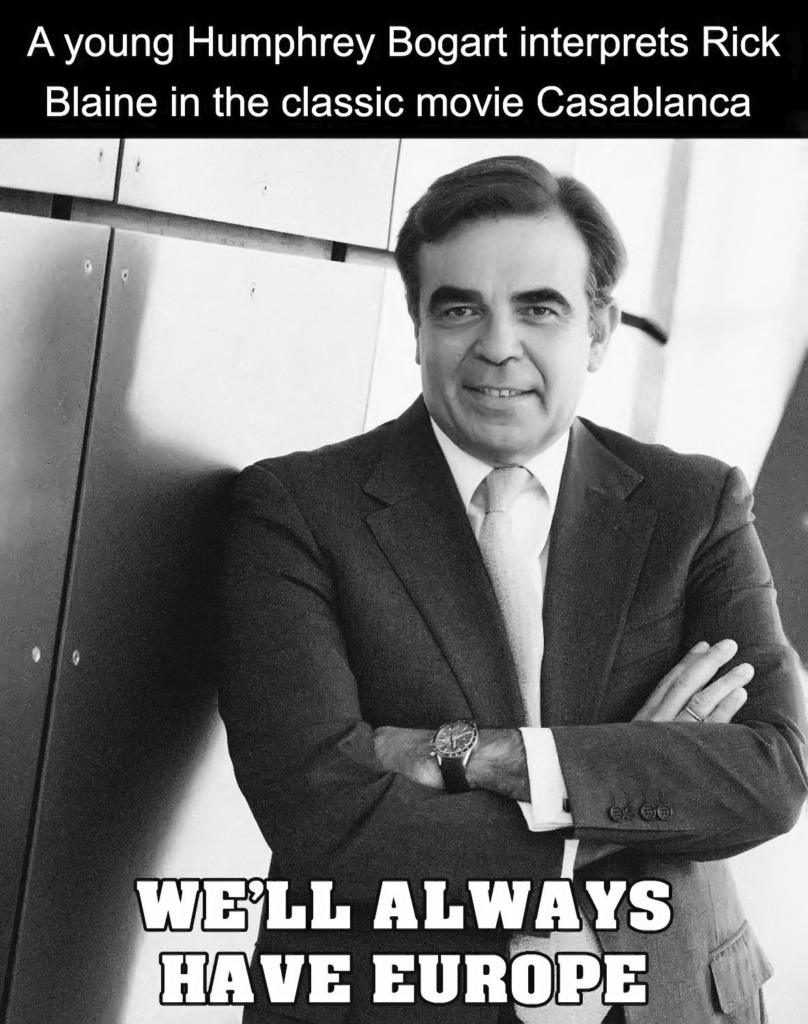
Your wife is Spanish, how was it to be an international couple back in the day?
It was fun and very easy here in Brussels. It was a bit more complicated to combine the Brussels dimension with our respective national dimensions. But we always kept alive both languages at home: my wife speaks perfect Greek, I speak Spanish and both our kids were raised with both national cultures; we always spend Christmas in Spain, and Easter and summer in Greece. My wife was also one of the first Spaniards to join Brussels, brought by a new wave of EU-enthusiasm.
And for your families at home, was it easy for them to accept that you both married somebody who did not belong to their own cultures?
Well, my parents were always very open-minded and they knew how committed I was to the European project. My wife comes from a proud Asturian family, and maybe it was more difficult for them. But with time everything became natural.
After all, in the Brussels Bubble, international families are the norm.
True, I think a European life helps sustaining a European profession. But that’s not always a given, not everybody manages to adapt to a multicultural and intercultural environment.
I think a European life helps sustaining a European profession. But not everybody manages to adapt to a multicultural and intercultural environment.
International relationships are complicated but also rewarding… Do you have any examples of cultural misunderstandings that happened in your family?
I’d say linguistic misunderstandings rather than cultural: keeping both languages alive inevitably leads to lots of funny moments, when Greek and Spanish would be assembled in a way that would only make sense in the family, but not outside of it. And for my children, the question they hate the most is: “Do you feel more Greek or Spanish?”.
Talking about the Spanish language, some colleagues from the SPP [the Commission Spokesperson’s Service, ed] told us that the expression you use the most is “Montas un circo y te crecen los enanos” [“you set up a circus and (suddenly) the dwarves grow up”], a Spanish idiomatic sentence to express having bad luck. Were there a lot of unexpected situations when working as Chief Spokesperson?
Quite a few, but I think it goes hand in hand with the job. It was obviously an immense pride to be Chief Spokesperson of the European Commission, it’s something that combines the knowledge of the house with the political understanding of the Union. I was very honored that Juncker saw this in me and I benefited from his unwavering support in very difficult situations.
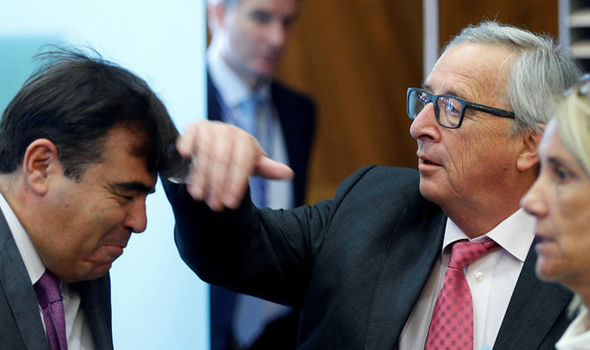
What was the hardest moment?
The Greek Crisis, without any doubt: the discussion was very polarized, it was market-sensitive, it was politically charged and very emotional. And it was not only a local Greek news, it was planetary. So every time I took the podium, I tried to position the Commission in a way that it would respect all this complexity. My worst nightmare was that I would have to announce the exit of Greece from the Euro. And in a couple of situations I thought this might really happen. Luckily it all worked out. It was very challenging, but we had a very great team and we had Juncker’s full support.
Do you miss him?
He is in the building, I see him from time to time, but I had to turn the page, because now I have a very demanding job. I cannot spend so much time with him, but I still find myself cannibalizing his expressions, his sentences, his thoughts. Very often I say: “In this case, Juncker would have said”…
The Greek crisis was the hardest moment as Chief Spokesperson. My worst nightmare was that I would have to announce the exit of Greece from the Euro.
What is the quote by Juncker that you use the most?
I have two favorite sentences. The first one is: “We have to distinguish between two groups of Eurosceptics: those who have questions, worries or concerns about Europe; to that group, we need to provide answers and good policies. The second group is made of those who are out to destroy Europe; and we need to get to them first, because otherwise they will get to us”. I think this is very pertinent, especially now that the European elections are close.
The other sentence, he said it at the Arab League summit. A journalist asked him: “Mr. Juncker, how does it feel doing business with dictators?”. And Juncker said: “If I were to deal only with democracies, my working week would end on Wednesday morning”.
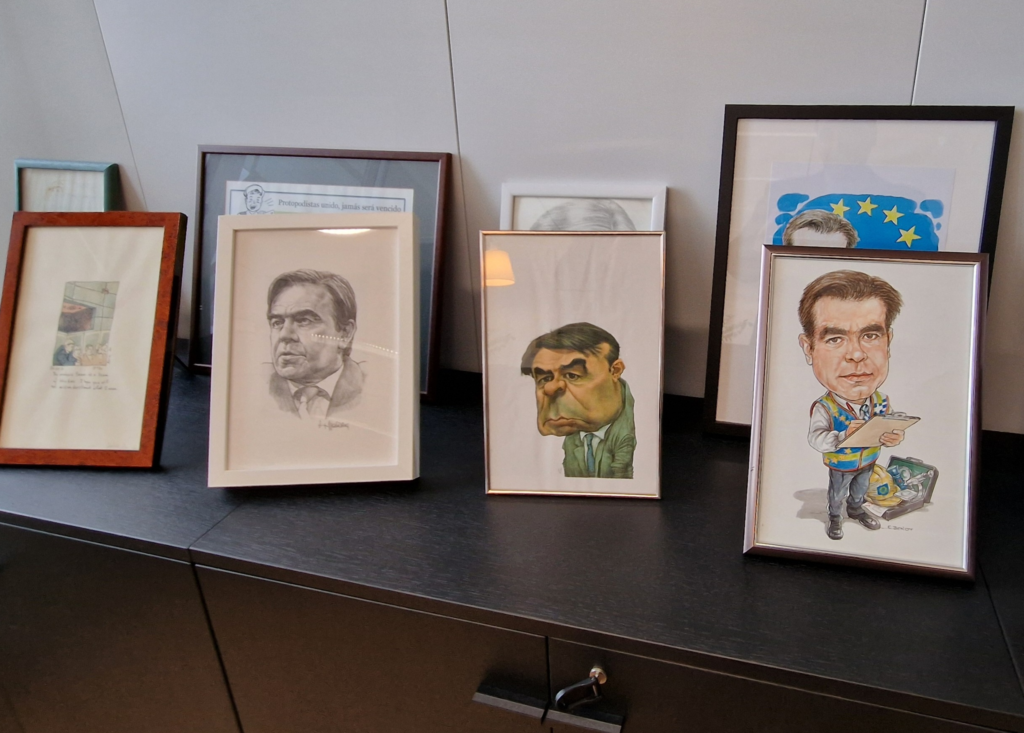
As the unofficial jester of the European Union, I must confess I really miss his communication style and his spontaneity. But as a Spokesperson I guess it was not always easy to deal with his stunts, was it?
Again, it’s part of the job. But he was much better in those unscripted moments than in the scripted ones. He felt enslaved by the script; but when he was himself, he was at his best.
One question about your portfolio, I’m sure everybody asked you in the past, but maybe after almost five years you have a new angle: how would you define the European Way of Life?
I have answered this question zillions of times. There is a boring, legal answer and a true, political answer; I’ll give you both: the boring legal answer is the Article Two of the Treaty on the European Union, it enshrines and describes our values and what we stand for.
The political answer is that we are a union of democracies, that we have minorities with rights protected under constitution; we’re the world champions of Human Rights and Data Protection; the role of women is safeguarded in the family and in the society; we have universal and free education and health systems; we take care of our elderly and we do not have a death penalty. All this together is the European Way of Life.
The initial name of the portfolio was “Protecting our European Way of Life”, did you come up with the name?
No, it came from the President of the Commission herself. But the story of this naming is quite complex: when Ursula offered me this job she told me: “Look, I want someone to coordinate migration, security, health, border protection, and combine this with policies on education, culture, mobility opportunities and environment. I want someone who will steer and coordinate all this under one single roof”. So she described the content and she said: “We will call it the European Way of Life”. So all the commotion was more on the portfolio name, rather than on the content.
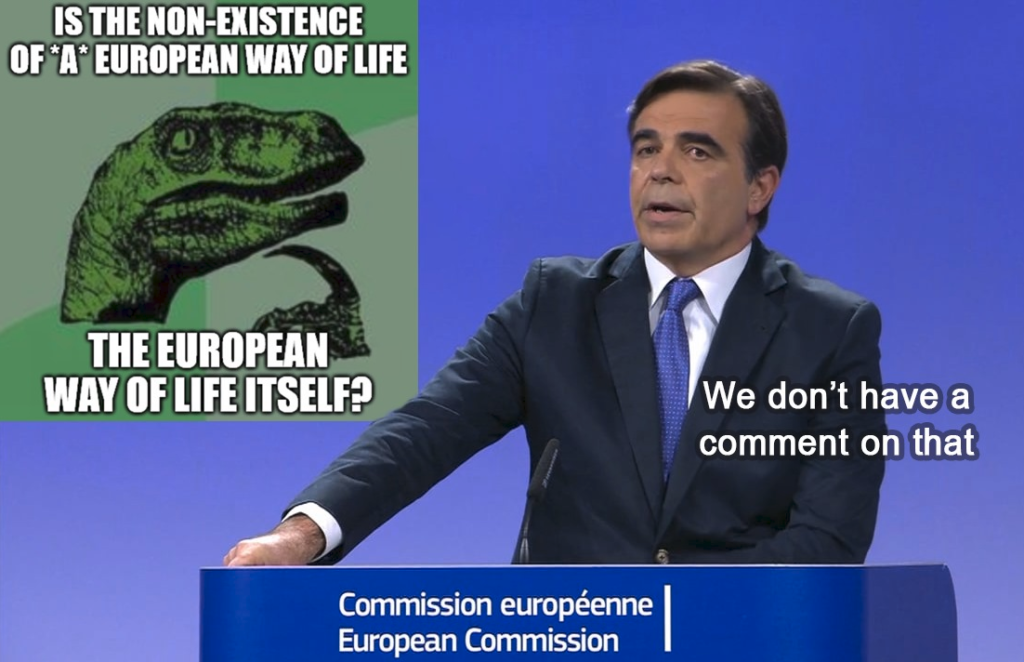
The Parliament didn’t like that…
My hearing [every commissioner-designate must have the approval of the European Parliament to become a Commissioner, ed] at the Parliament was the longest hearing in EU history, three hours and twenty minutes. I was passionately defending my portfolio and I think I got it, there was a turning point when the Parliament saw that it was not like a bulldozer, which crashes everyone who is not European, but more like a mirror that reflects the diversity of what we stand for.
And five years later, I had my sweet revenge when Zelenskyy came to the European Parliament plenary. In his speech, he used the term European Way of Life twenty-one times. And the very people who crucified me at that time, they were enthusiastically applauding.
But they crucified you because of the verb “protecting”, which was later changed into “promoting”.
It was a schizophrenic debate out there: they said it was a dog whistle for nationalism, that it was Trumpian, some sort of Make Europe Great Again.
Still, it plays in the direction of a certain right wing narrative: if you have to protect it, it means that it is under attack. What is your take on this?
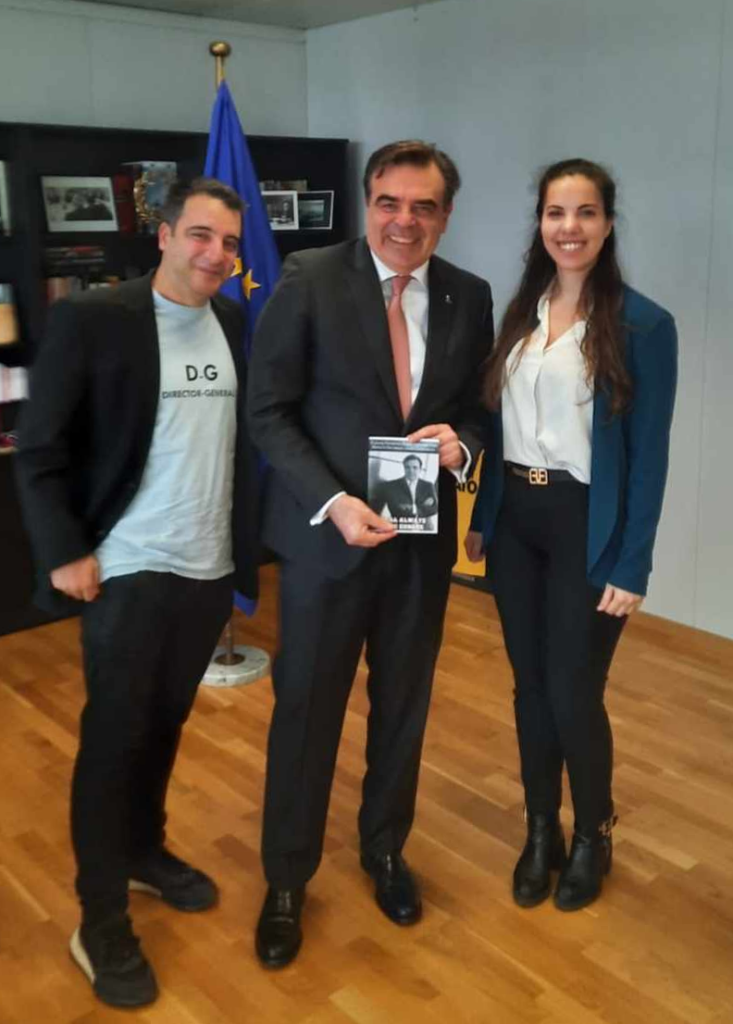
I think this portfolio is the best way to deprive the extreme right of claiming that they defend the European Way of Life, which according to them is white and Christian, with closed borders. When you do what we’re doing, opening up, finding a system for migration, tripling the Erasmus funds, developing vaccines and a health union, you show that we created a common heritage for all of us, which goes beyond the limited extreme-right narrative.
So you still think that the original name would have been better for your portfolio?
I think all this discussion was excessive, it was a storm in a teacup. Defending and promoting is part of the same thing… We can find ten other different verbs, but in the end what really matters is making the EU model sustainable over time.
Do you think we managed to do that? Did we manage to coordinate less visible policies, like education and culture, with inclusion, health and migration?
Absolutely. For example, health in Brussels has always been an industrial issue. Now, in these past five years, people said: “Why do we need Europe if we don’t have a common health policy?”. It became a people’s thing, just like Erasmus, for which we tripled its funds from 9 to 27 billion euros, which is a lot, if you consider that for defense we have 1.5 billion. All the work we did in this cluster of the European Way of Life is very anthropocentric: it is not about tariffs and bureaucracy, it is about what matters to people.
To lighten up the conversation a bit, in your days as Chief Spokesperson you often referenced pop culture, like Spice Girls, ABBA, Chic… Do you listen to music a lot?
I like music a lot, but I also like to sustain my political argument with something that people can understand. And I always say that we should “de-Brusselize” Europe, which is exactly what you with DG MEME are doing. I think it’s something that is long overdue.
So when a journalist asked a question about Brexit, I quoted ABBA [“Breaking up is never easy”, a reference to the 1977 ABBA’s hit “Knowing Me, Knowing You”, ed] because I thought it was the best way to answer.
Very effective, “Where words leave off, music begins”.
And I have another glorious example: there was this story circulating about the European Union wanting to ban Belgian frites. And I had this very robust line, saying: “No, this is not true”. But as I was developing the line, I thought that no logical argument would be enough. So I decided to misquote a song [“Le Freak“, a 1978 funk-disco song by American R&B band Chic, ed] and came up with: “Les Frites, c’est chic!”. This went all over the news, you know, like when I talked about Taylor Swift.

As I was developing the line, I thought that no logical argument would be enough. So I decided to misquote a song. And this went all over the news.
Obviously this was going to be one of our questions! Did you contact her?
I give you a hint: I don’t think that contacting Taylor Swift formally would be the best approach. But when she is in Paris on the 9th of May, on Europe Day and one month before the European elections, that’s when we need to create the conditions so that she gets the message and does the right thing.
And are you actively working to create these conditions?
Aaaah, now this is like a Press Room question, let’s leave some mystery.
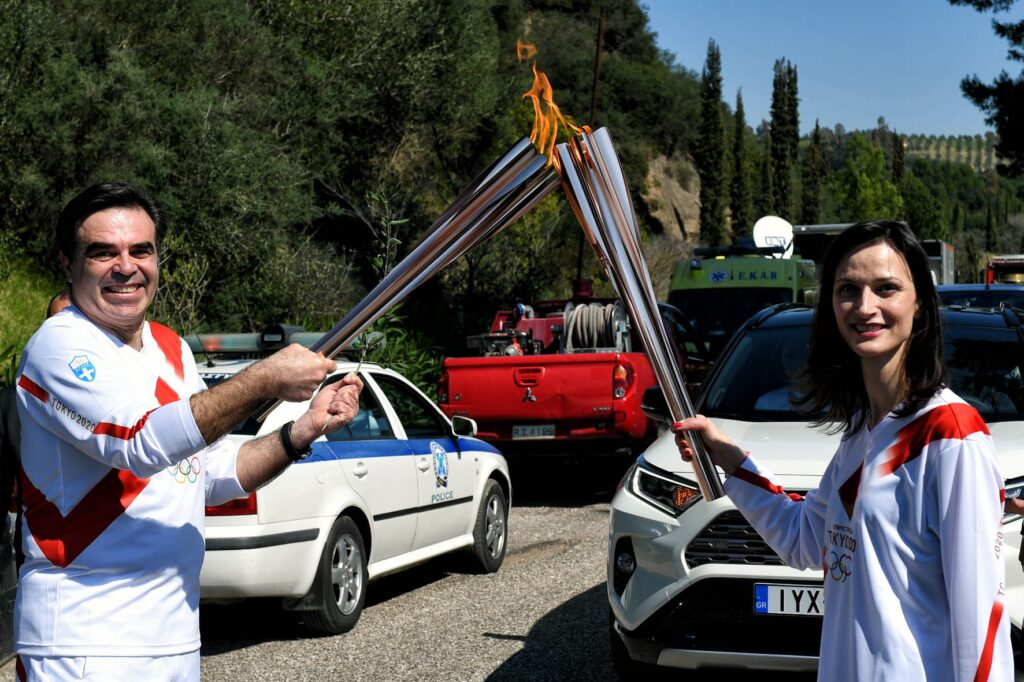
Alright, but do you listen to her? When you made this suggestion, it seemed to me like a LTT [Line to Take, an indication on how to answer questions on a certain topic, ed] that one of your advisors wrote for you…
[chuckles] I’m not a Swifty, but I read that she made an Instagram post to support the US Elections and on the following day 60,000 new people registered to vote. That was the day before we had the boring launch of the Youth Package here in Brussels. And then one of my assistants told me that she would be in Paris on the 9th May. So I’m not a Swifty, but I think that this is an opportunity we cannot miss. Those days will be big European days: on the 8th May, the Olympic flame will reach Marseille from Olympia and on the 9th, there is her concert in Paris.
Talking about that, during COVID you had the great honor to carry the Olympic Torch, unfortunately in front of an empty stadium. How did you feel?
First of all, let me give you another piece of news: I will be torchbearer again in a few days. But back then it was the first week of confinement, so it was the last public event, everybody was worried. And when I received the torch I thought: “This ceremony has been going on for 3000 years, humanity overcame so many challenges: deluges, tsunami, wars… and we are still here”. So it was a moment of hope, mankind is stronger than any threats.
When I received the Olympic torch I thought: “This ceremony has been going on for 3000 years, humanity overcame so many challenges and we are still here”. Mankind is stronger than any threats.
Is this the message you will bring next week as well?
Yes, and I was even training for the run. But then I found out that the International Olympic Committee only allows a distance of 300 meters.

You could still try to set the speed record. How was it to be a commissioner during COVID?
I came to the office, with my assistant, every single day during confinement. It was not spooky, but it was different for sure. In late May 2020 we introduced the vaccine strategy and then we had the first physical meeting of Commissioners to decide on the Recovery Fund. It felt like a “we’re out of the trouble” moment. But then in late November I fell sick and I was hospitalized in Saint Luc, I got the second wave of infections. And when I came out of the hospital, I switched on the TV at home and the first news was that Biden won; and that the vaccines were licensed. So it was very tough but also comforting to see that Europe managed the crisis.
Many positive messages here, it feels good. Talking about good spirit, what is the funniest moment that happened at the College Meeting [the weekly meeting of the 26 Commissioners with the President of the European Commission, ed]?
Funny?
Yes, is there anything funny happening at the College of Commissioners?
Well, the funniest moments happen before the college starts, when everybody is relaxed, we just came back from some missions, we always have some stories to tell. That’s the only part which is not scripted by our Heads of Cabinet [laughs]. When the formal College starts, the potential for fun is limited. Anyways, most of the time the pre-college talks are about our travel experiences: “Oh, I was there and you were there? And you?”. The other thing is that I often rush to my colleagues to remind them not to talk in front of the cameras, even if they’re off, because the mic could still be on.
There is a North-South divide before the College Meeting
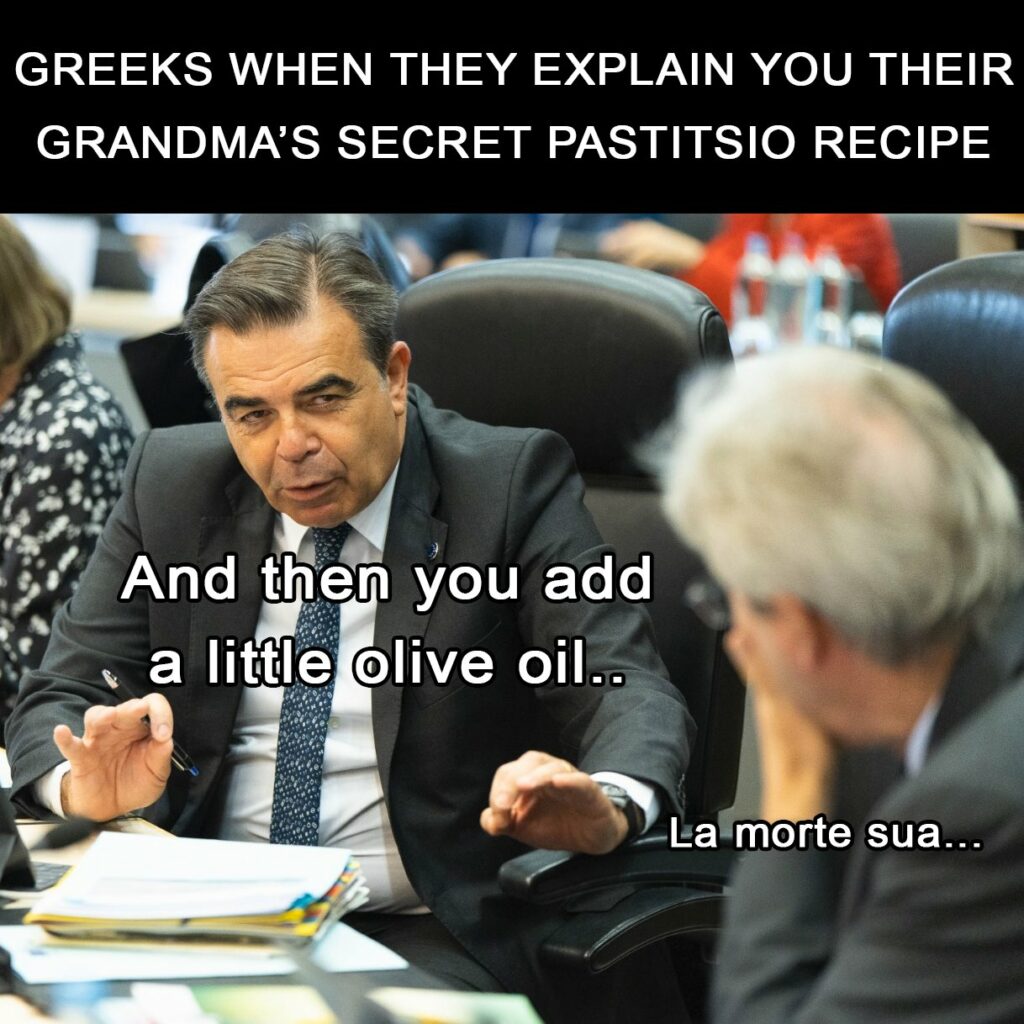
Ah, they blabber too much, good that as a former Chief Spokesperson you know all the tricks.
I try my best. Anyways, all in all, there is a very good atmosphere in the College of Commissioners but I wouldn’t qualify this as extremely funny.
In these pre-college bonding moments, are there well-defined groups?
Clearly, clearly. There is a Baltic/Scandinavian Caucus, also because they’re all ladies: Margrethe [Denmark], Ylva [Sweden], Jutta [Finland] together with Kadri [Estonia]; then there are the southerners: Paolo [Italy], Thierry [France], myself, sometimes Stella [Cyprus] and Elisa [Portugal]; and the others they play and mingle with everybody. But yes, there is a north-south divide.
I did enjoy those photos when you went by bus to visit the Belgian Presidency. I guess you had some laughs in that informal environment?
Oh yeah. We also have some fun when we go to seminars. Where Ursula, being German, always has a short lunch and a long walk, while for us southerners it’s the opposite.
And on this note, I think it’s time for lunch for us too. Thank you so much for your time!
A big thank to Vangelis, for helping organizing the meeting; to Martina, for the support and the photo printing; to Raphael, for the archive work; to Anna, Antonis and Martina for proof-reading the draft; and to all the photographers I stole the pictures from; I hope you’re fine with that, otherwise let me know, I can also add credits, in case, or remove the photos.
